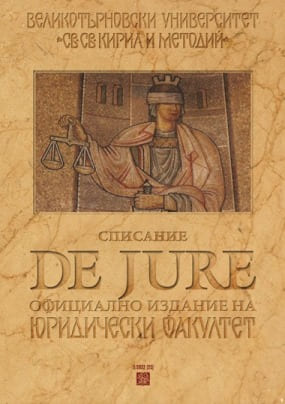Новите субекти на правото – сред нас ли са системите с изкуствен интелект?
The New Subjects of Law: Are Artificial Intelligence Systems Already among Us?
Author(s): Diana KovachevaSubject(s): Economy, Law, Constitution, Jurisprudence, Human Rights and Humanitarian Law, ICT Information and Communications Technologies, Philosophy of Law
Published by: Великотърновски университет „Св. св. Кирил и Методий”
Keywords: artificial intelligence systems; robots; human rights; legal personality; liability for damages
Summary/Abstract: The study explores the issue of legal personality and liability of artificial intelligence (AI)systems. A real AI should have a will and self-awareness, but, at this point, there are mainly systems with a collective “cloud” intelligence that is located outside of them, supported by people (Sofia, the chatbot Miraya, the chatbot Tai, the xenobots). It is important to be clear about the fact whether robots are still only a “means”, a “tool” that facilitates human life, or whether they already have qualities that make them independent entities. Currently, AI systems are treated as objects of law. Granting legal personality similar to that of legal entities is not a solution as well because of their specific nature. If, in the future, intelligent systems become independent and emancipated from the human beings that created them, they could be considered a new specific subject – a legal person sui generis. The regulatory framework of international organizations in this area already places robots in the category of “electronic person” (EU) and binds their legal status to the protection of basic human rights. At this point, a number of practical issues are yet to be resolved – identifiability, establishment of a register, and up-to-dateness of the data in it. The possible granting of legal personality to AI systems, even specific or limited one, raises the question of the rights of robots themselves (procedural legal capacity, property rights, labour rights, tax legal personality), as well as of the responsibility for damages and their compensation. One of the most important issues in the development of intelligent machines is the extent to which we should allow them to make autonomous or automated decisions. Algorithms, which are initially set and related to the protection of fundamental human rights, should be stable, or “locked” for changes by artificial intelligence systems in the context of their improvement and self-learning. The issue of human control is important, especially in cases where decisions might affect human life, health, and social support. The rapid development of digital technologies should make us think about a future in which AI systems can deviate so much from the basic algorithms set by humans that joint and individual financial liability can be reached. The theory also discusses the issue of the applicability of criminal liability to robots.
Journal: De Jure
- Issue Year: 22/2022
- Issue No: 2
- Page Range: 227-249
- Page Count: 23
- Language: Bulgarian

